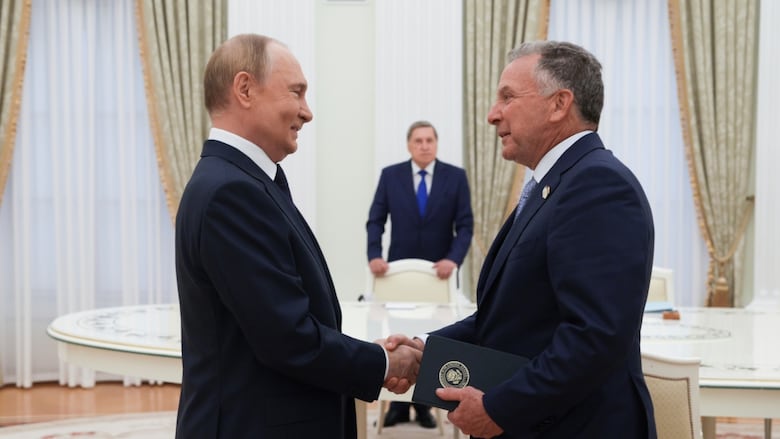U.S. envoy Witkoff meets with Vladimir Putin in Russia for renewed ceasefire talks
U.S. President Donald Trump's self-imposed deadline on Russia to stop aggression in Ukraine just days away

Russian President Vladimir Putin held talks with U.S. President Donald Trump's special envoy Steve Witkoff in Moscow on Wednesday, the Kremlin said, days before a deadline imposed by the U.S. president for Russia to reach a peace deal with Ukraine or potentially face severe economic penalties.
The meeting between Putin and Witkoff lasted about three hours. Neither side gave an immediate readout of the talks.
Trump initially gave Moscow a 50-day deadline but later moved up his ultimatum — the new deadline ends Friday — as the Kremlin continued to bomb Ukrainian cities. He has threatened "severe tariffs" and other economic penalties if the bombing doesn't stop.
Trump has also threatened to slap tariffs on countries that are buying Russian oil, which could increase import taxes dramatically on China and India. On Wednesday, he signed an executive order — to go into effect in 21 days — to place an additional 25 per cent tariff on India for its purchases of Russian oil, bringing the combined tariffs imposed by Washington on its ally to 50 per cent.
Earlier Wednesday, Witkoff met with Kirill Dmitriev, the Russian president's envoy for investment and economic co-operation, footage aired by TASS, the Russian state-owned news agency, showed. Dmitriev played a key role in three rounds of direct talks between delegations from Russia and Ukraine in Istanbul in recent months, as well as discussions between Russian and U.S. officials.
Those negotiations have led to exchanges of war prisoners but not progress on curtailing the three-year war following Russia's invasion of its neighbour.

Talks follow Trump-Medvedev war of words
Putin has given no hint that he might be ready to make concessions.
Instead, the Russian leader and senior Kremlin officials have talked up the country's military strength. Putin announced last week that Russia's new hypersonic missile, which he says cannot be intercepted by current NATO air defence systems, has entered service.
Former Russian president Dmitry Medvedev, meantime, warned that the Ukraine war could bring Russia and the U.S. into armed conflict.
Trump responded to that by ordering the repositioning of two U.S. nuclear submarines.
Trump came to office a second time after a presidential campaign in which he promised to be able to quickly broker an end to the war between Russia and Ukraine, while criticizing the billions in military aid provided to Ukraine by the Biden administration, even as many of the exports benefited U.S. arms manufacturers.
Trump has made no public promise of weapons or economic support for Ukraine but has instead encouraged other NATO members in Europe to step up.
Air defence systems are in greatest need. The United Nations has said that Russia's relentless pounding of urban areas behind the front line has killed more than 12,000 Ukrainian civilians.
The Kiel Institute, which tracks support to Ukraine, estimates that as of June, European countries had provided 72 billion euros ($114.8 billion Cdn) worth of military aid since the start of Russia's full-scale invasion in February 2022, compared to 65 billion euros in U.S. aid ($103.7 billion Cdn).
European allies and Canada are buying most of the equipment they plan to send from the United States, which has greater stocks of ready military material, as well as more effective weapons.
2 people killed in Zaporizhzhia
Western analysts and Ukrainian officials say Putin is stalling for time and avoiding serious negotiations while Russian forces push to capture more Ukraine land. A Russian offensive that started in the spring and is expected to continue through the fall is advancing faster than last year's push but is making only slow and costly gains and has been unable to take any major cities.
The situation on the front line is critical for Ukrainian forces, but defences are not about to collapse, analysts say.
Overnight from Tuesday to Wednesday, Russian forces hit a recreational centre in Ukraine's southern Zaporizhzhia region, killing two people and injuring 12, including two children, regional Gov. Ivan Fedorov said Wednesday.
Russian forces launched at least four strikes on the area and initially attacked with powerful glide bombs.
"There is zero military sense in this strike. Only cruelty to intimidate," Ukrainian President Volodymyr Zelenskyy said in a post on Telegram.
Russia also struck the Ukrainian power grid and heating gas facilities, Zelenskyy said.
With files from CBC News

